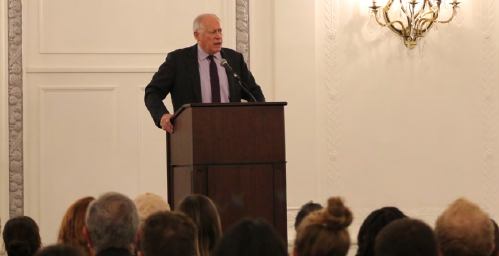By LeeAnn RevisSchool of Public Service
Here’s how former Illinois Gov. Pat Quinn responded to his loss to Bruce Rauner in the 2014 election:
He went to work.
Two years after losing the
governor’s office, Quinn is touting a campaign called
Take Charge Chicago, which would establish an elected city watchdog and limit the mayor to two terms – thereby targeting what Quinn calls an insider government culture.
Quinn also aims to create an elected consumer advocate for Chicago who would serve as a government watchdog.
“When you lose an election, you don’t lose your life,” Quinn told DePaul University’s School of Public Service community in early November. “You find another hill to climb.”
Quinn made his comments during the 22nd School of Public Service H. Woods Bowman Annual Lecture.
The annual event honors
Woods Bowman, the School of Public Service professor emeritus who died in a 2015 car crash. Bowman left a legacy that included stintsover parts of six decades in politics, finance, economics, the nonprofit industry and, most of all, education and public service.
Quinn said he knew Bowman from when Bowman served as a state representative and in Cook County government.
“You have to have well skilled well educated people like Mr. Bowman,” Quinn said.
Before a packed auditorium at the Chicago Hilton, Quinn covered a wide range of topics that underscored his Democratic policies as governor. He discussed criminal justice reform, the minimum wage, school boards, higher education, grants for low-income students, legislative pay, taxes, ethics, advocacy, consumer rights, health care, mental health, referenda, voting, infrastructure, transportation, and, of course,
public service.
“Whatever is your passion,” he said, “find ways to volunteer.”
He also discussed the
impeachment of former Gov. Rod Blagojevich, whom Quinnreplaced.
“I never thought I would be here, but the guy before me, he really screwed up,” he said.
As governor, Quinn touted his
work on infrastructure and efforts to enroll people in
Get Covered Illinois, the state's online platform for uninsured residents to sign up for health coverage under the Federal Affordable Care Act, also known as Obamacare.
Quinn told audience members
that he worked on
clemency cases until noon of his last day in office. He did about 5,000 over the course of his term, he said.
He said he sees “history-making actions” on criminal justice reform from Barack Obama in the final months of the president’s second four-year term.
“The current system is very expensive,” Quinn said. “We need to review what is really necessary. There are others that are better off with a consequence that isn’t behind bars.”
Quinn emphasized the power of citizen referendums to facilitate statewide change. He is relying on the referendum process to generate momentum for both of his current initiatives.
“We have inside politicians who think they know it all and then they start arguing with each other and create gridlock,” Quinn said.
He said he hoped that the Take Charge Chicago campaign would empower voters to help government move beyond gridlock and insider control.
“We unfortunately have some local King Georges here,” Quinn said.
That’s not the heart of America, he suggested.
“The heart of America is the heart of a volunteer,” he said.